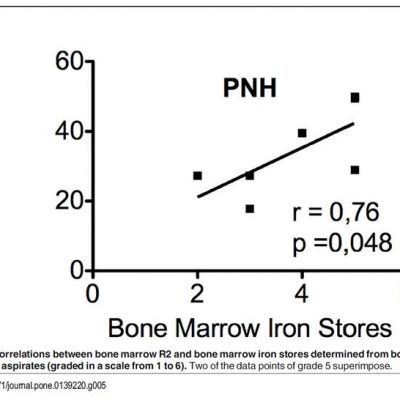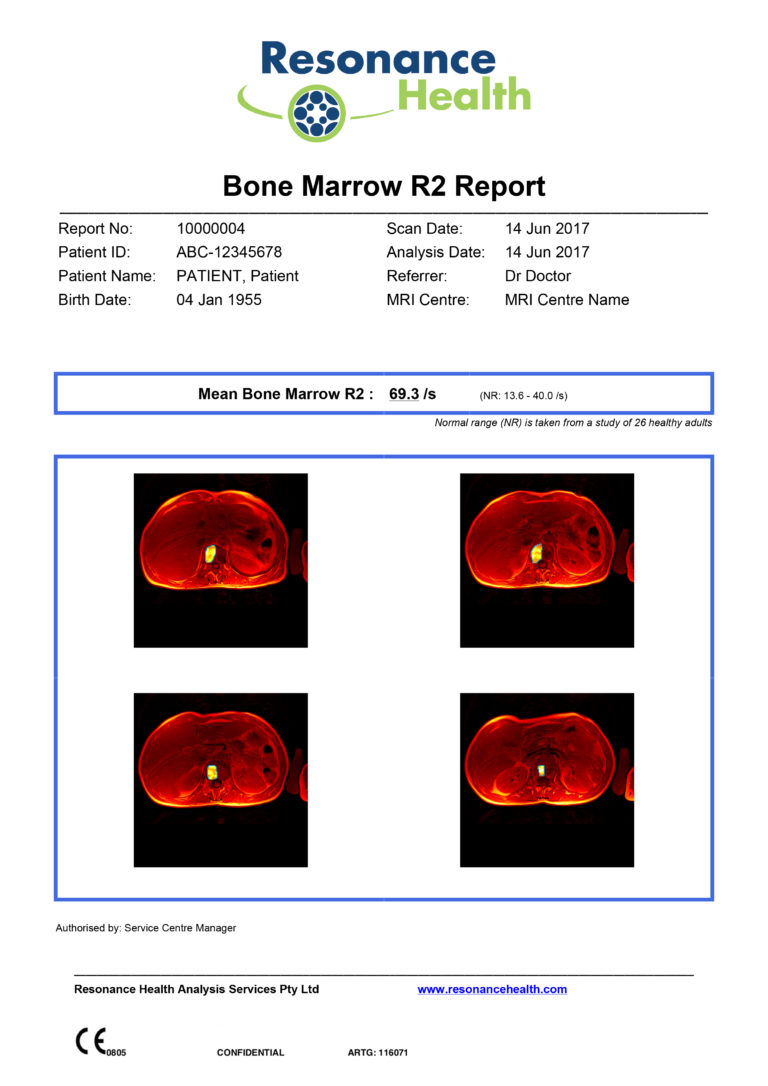Bone Marrow R2-MRI
Assessment of iron levels in the bone marrow
Bone Marrow R2-MRI is an MRI-based solution for assessing iron levels in the bone marrow. Both decreased and increased bone marrow iron are of clinical significance; for example multiple blood transfusions can result in greatly increased bone marrow iron and conversely, the definitive test of iron deficiency is examination of iron from bone marrow aspirates.
Elevated bone marrow iron levels prior to bone marrow transplant may be associated with complications and a range of poorer health outcomes following transplant, including:
- Lower overall survival and lower disease-free survival;
- Independent risk factor for invasive aspergillosis- a major cause of death following hematopoietic stem cell transplantation;
- Increased risk of severe infection or bacterial infection.
Quantitative assessment of bone marrow iron pre-transplant may help to predict complications and the prognosis of patients post-transplant and also inform the use of precautionary interventions (anti-bacterial, anti-fungal, iron chelation, or phlebotomy) to improve patient outcomes.
Dr Josu de la Fuente, Consultant Paediatric Haematologist and Senior Lecturer at Imperial College London and Director of the Paediatric Blood and Marrow Transplant Programme, commented:
A non-invasive standardised method for assessing bone marrow iron may provide important additional clinical information to assist in managing patients being considered for bone marrow transplant as severe complications such as graft versus host disease can, in some cases, become more severe and costly to manage than the original disease of the patient.”
The Worldwide Network for Blood and Marrow Transplantation estimates that more than 50,000 patients are transplanted annually for certain cancers, such as leukaemia, lymphoma, myelodysplasia, or for diseases that affect the production of bone marrow cells, such as aplastic anaemia, severe immune system illnesses, sickle cell disease, and thalassaemia. Patients also require bone marrow transplantation as a result of chemotherapy for other diseases.

Bone Marrow R2-MRI as an Alternative to Biopsy for Assessing Bone Marrow Iron Levels
The current gold-standard for assessing bone marrow iron is histopathological grading, which is semi-quantitative, non-standardised, and subject to large inter-observer error. Bone Marrow R2-MRI is non-invasive, quantitative, and correlates significantly with iron in bone marrow biopsy.
Figure 5 (shown to the left): shows an example in paroxysmal nocturnal hemoglobinuria
Bone Marrow R2-MRI Availability
With the standard high level of scientific rigour and ISO-certified quality of all of Resonance Health’s services, Bone Marrow R2-MRI is now available for clinical application in Europe, Australia, and New Zealand. It is also available globally for clinical studies and pharmaceutical trials.
Bone Marrow R2-MRI Process
Image data acquisition is performed at partner radiology centres across the globe with verified MRI scanners; ensuring quality control and standardisation of data acquisition. Data is then transferred electronically to Resonance Health’s ISO-certified central Service Centre via a secure online system.
Every MRI dataset undergoes stringent quality control checks, standardised patented analysis, a second read of analysis results, and quality assurance release. The report is then transmitted electronically back to the radiology centre with a mean R2 value reported in the range 10 to 200s-1. Normal range is 13.6 to 40.0 s-1.
Key Bone Marrow R2-MRI Features:
- Non-invasive, no contrast agents, and a scan time of approximately 10 minutes;
- Quantitative results correlate significantly with iron in bone marrow biopsy;
- Acquired with the FerriScan MRI scanning protocol – a single MRI scan can provide a picture of total body iron stores plus specific bone marrow iron levels;
- Image analysis and reporting is performed at a central ISO 13485 certified Service Centre;
- Now available for clinical application in Europe, Australia, and New Zealand for clinical studies and pharmaceutical trials globally;
- Requires no breath-hold and may therefore be used for paediatric patients;
- Suitable for 1.5 T MRI scanners;
- There is no requirement for customers to purchase new software or hardware;
- Charge per scan only – no licence or subscription fees;
- Results available within a target time of two business days.
Comprehensive Iron Health Assessment
Bone Marrow R2-MRI data is acquired with the same MRI scanning protocol as FerriScan – the regulatory cleared and globally recognised gold standard for measurement of liver iron concentration (LIC) – the most effective measure of total body iron stores.
Bone Marrow R2-MRI can be performed as a standalone assessment or combined with FerriScan to provide more complete picture of a patient’s iron status. Resonance Health also provides a Cardiac T2* measurement for heart iron assessment to enable better-informed decisions for the management of patients at risk of iron-induced organ damage.
FerriScan is currently used to assess body iron stores prior to transplant at leading institutions. The new bone marrow specific test has the potential to further assist clinical decision making pathways for patients being considered for bone marrow transplantation. Improved monitoring and management of iron prior to transplantation may assist in decreasing complications and improving health outcomes.
Please contact Resonance Health to discuss partnering on your clinical, study, or trial needs.
Bone Marrow Resources
Click the link(s) below to access our resources. Need something else? Please contact our team at [email protected] for further information.
